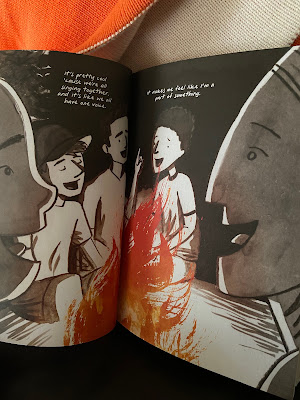Flamer, a semi-autobiographical graphic novel by Mike Curato, is an emotional story of Aiden, a Filipino American boy who is spending his last week of summer break at his favorite place, his scout camp. The year is 1995 so the times reflect an era of homophobia, bullying, and lack of resources that could help a teenager who is questioning his identity.
I was surprised to learn that Flamer has been challenged and even banned in school libraries across the country, despite winning a book award. The audience for the book are young adults who are the same age as the main character. Readers will be able to empathize with Aiden's apprehension for starting high school, his insecurities about his body image, and his surprising attraction to his friend. Although the book climaxes with a suicide scene, Aiden does not go through with it and it ends on a hopeful note. The author's note states that these were actual instances that he experienced so I believe it will help others, either as a friend or family member of a person exhibiting Aiden's characteristics or for people thinking similar thoughts as Aiden.
What I liked about this book was the honesty with which Aiden's voice permeates the entire story. I have yet to read a book that explores a boy's insecurities about his body with as much care as Curato write's Aiden's feelings. Many readers will be able to relate to Aiden and his reluctance to draw attention to his body as he constantly compares it to others in his camp.
Another aspect of the book that stood out to me was the setting. Aiden finds so much peace in being outside in nature that it becomes his happy place. I think that other readers may also find solace in going outdoors when they are feeling stressed or need room to think. It also may encourage others to seek out ways to spend time outdoors with friends to increase endorphins and relieve them of social anxiety. The camp also lends itself to a sense of community that readers may look to join in order to feel as a part of a group.
As a junior high teacher and librarian, I can attest that the moments of bullying and teasing are 100% authentic. In Flamer, the reader experiences what Aiden does as he tries to navigate his place in an ever-increasing environment that tells him he needs to be an "alpha-male" while he doesn't have those inclinations. He also has racist remarks thrown at him for being Asian. At one point, a well-intentioned friend, tries to tell Aiden to draw less attention to himself and Aiden questions how he can do that. This is a very real dilemma that teens go through and Curato writes this delicate scene with such care, it's incredible. Readers can discuss what their experiences have been with racism towards Asian people and what they can do to stand up against that hate.
Finally, the part that I really enjoyed was Aiden's relationship with his only friend who allows him to be his true self. His pen pal, Violet, is a trusted ally whom Aiden confides his thoughts. This is a beautiful model of how even having one person who is on one's side makes a big difference in a person's life. Allyship is a topic that young people can discuss throughout this story and into their own lives. Aiden has some people who seem to be on his side but then change their mind once they realize that others call him out about being gay.
Aiden's coming-of-age realization about his sexuality is something that others may be able to relate. His religion has taught him that homosexuality was wrong so Aiden denied being gay when his classmates bullied him about it. Only after his dreams started showing his true feelings was when he started to come around to possibly accepting this aspect about himself. Some of his trusted scout leaders tried to help him through being himself but they ended up being outed and ultimately fired from the scout camp. This is another reflection of the times and even some discrimination against the LGBTQ community in today's world. Readers can discuss the factors that are at play and what they can do when they see this happening in their communities.
Overall, Flamer is a book that embodies a number of adolescent emotions and should be available to young adult readers who want to read it. It would also benefit educators, counselors, social workers, families and care givers to read it in order to broaden their understanding of a young person's needs during this critical time of their development. It may very well save a life.






















.jpg)
.jpg)



